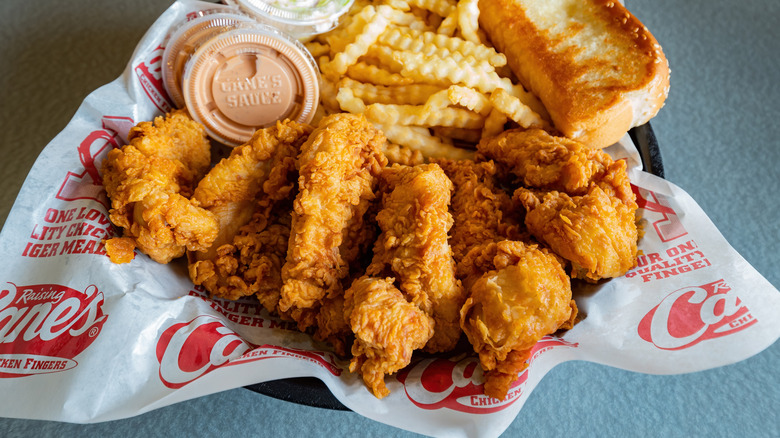Raising Cane's New Indiana Store Isn't Allowed To Sell Its Famous Menu Item
Nationwide fast food chain Raising Cane's was founded on "one dream" and "one love," according to its website. What Raising Cane's is referring to is that it serves only boneless chicken fingers and sandwiches made therefrom — at least as far as its entrees go. Of course, Raising Cane's menu also offers side dishes, including French fries, coleslaw, dipping sauces, Texas toast, and beverages. But clearly, boneless chicken is Raising Cane's bread and butter, so to speak.
One might expect that whenever Raising Cane's signs a lease for a new restaurant location, the space that is being leased is not and will not be subject to any restrictions on how the space is to be used, or at least conditions that might interfere with Raising Cane's ability to conduct its primary business, per The Washington Post. Yet Raising Cane's now finds itself in the unprofitable position of having signed a 15-year lease worth roughly $2 million for approximately 3,000-square-foot of space in a Hobart, Indiana shopping mall — and having commenced six weeks of construction at the site (per Fox 59 Indiana) — only to discover that the space in question is subject to a significant restriction on said usage, according to the Northwest Indiana Times.
Specifically, this particular Indiana location of Raising Cane's, should it ever open, will not be allowed to sell its famous menu item — or any other boneless chicken dish, period. Here's why that is and what Raising Cane's is trying to do about it.
Another chain has the exclusive right to sell boneless chicken in this location
Raising Cane's has filed a lawsuit in Texas federal court against an Indiana shopping mall, Crossings of Hobart, and the mall's Ohio-based owner, Schottenstein Property Group, per Fox 59 Indiana. Specifically, the lawsuit, filed earlier this year, alleges the defendants defrauded Raising Cane's by failing to disclose the leased space is subject to a "restrictive covenant" banning the sale of boneless chicken by anyone but McDonald's, per NW Indiana Times. The restriction arises from an existing agreement between the previous shopping mall owners and a nearby McDonald's. The upshot is that one of Raising Cane's new Indiana restaurant locations will not be allowed to sell its famous menu item — its boneless chicken fingers at the mall.
Per the lawsuit (via Fox 59 Indiana), " ... Defendants specifically did not disclose this issue before the Lease was executed." All of this is despite the prior knowledge of what Raising Cane's primary product was. The suit further alleges the defendants allowed eight months to go by after lease execution, and a million dollars worth of construction, before informing Raising Cane's of this material issue.
Moreover, the suit states that the defendants were aware of McDonald's intention to strictly enforce the restrictive covenant (thanks to McDonald's having denied a request made by the defendants — contemporaneous with Raising Cane's construction, to waive that same restrictive covenant about a Chipotle restaurant.
Raising Cane's landlord denies having defrauded the chain
The shopping mall and its owner have acknowledged the existence of a restrictive covenant preventing Raising Cane's from selling its chicken fingers at the mall, per The Washington Post. However, the defendants deny fraud. Instead, they apparently take the position that the restaurant failed to conduct the appropriate due diligence in a commercial lease transaction, which puts the onus on Raising Cane's (per GuideRock Realty). According to the Betensky Law firm, due diligence in the commercial lease context requires a title search, which would reveal restrictions on the use of the property being leased.
Indeed, an attorney for the defendant, Mario Little, told The Washington Post that Raising Cane's should have done a title search, that such a search was authorized by the defendants, and such a search would have unearthed the longstanding restrictive covenant, which is enforceable even after the shopping mall changed hands, per Westlaw. Moreover, Little told The Washington Post that the lease disclosed any preexisting restrictions.
Facts such as whether and to what extent the lease did address the actual restrictions in favor of McDonald's, and whether and to what extent a notice of said restrictions was actually available in the public records with regard to restrictions on use remain to be determined by the court. However, if Raising Cane's successfully pleads its fraud case, it wishes to void the lease and be compensated for costs incurred and lost profits.


